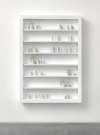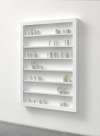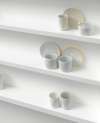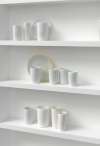a short history of the China trade
58 porcelain vessels, some with gilding, and 4 gilded porcelain shards in an aluminium, wood and plexiglass vitrine
2016-
About the work
- Location
-
Country: China
City: Beijing
Place: British Embassy
On this work, De Waal comments: ‘This is my very personal mapping of the thousand years of porcelain trade – the way in which China reached the rest of the world. It is a series of small porcelain vessels and dishes arranged on shelves and protected within a glass vitrine. It includes many celadons – the very beautiful blue-green glazes that epitomise Chinese porcelain. Here is the celadon of Marco Polo's vase in Venice – the first piece to arrive in the West – the colours of deep Imperial stem-cups. Here are all the whites – the whites of vessels for Buddhist ritual, the aspirational colours that Europe couldn't get and strived for, until they broke the secrets of the Arcanum. There is gold here too. Both porcelain as 'white gold’, the most precious of materials, and also on the broken shards of a vessel, referencing the way in which gold is used to mend broken porcelain in China and Japan.
The installation is also a series of repetitions - one attempt after another to make porcelain, one cargo after another of porcelain to reach the West.
I feel very honoured that a short history of the China trade will be installed in the British Ambassador’s Residence in Beijing, in a place on the threshold of where people come and depart. This piece is above all about the ebb and flow of trade, of ideas, of objects, of beliefs, and of images.’
Porcelain in China was the subject of De Waal’s book ‘The White Road’ (2015) including an account of his visit to Jingdezhen, known as the ‘Porcelain Capital’ from its tradition of pottery production for 1,700 years. With its long history, porcelain forms a bridge between the UK and China and in his words, this material, ‘somewhere between clay and glass’ speaks not just to emperors but to everyday people in China where porcelain is widely used.
‘a short history of the China trade’ was commissioned from de Waal in 2016 with the generous support of Rosamund Brown in memory of her husband, Charles H Brown; The Rothschild Foundation; The Sackler Trust and with assistance from Madeleine Bessborough, New Art Centre. -
Explore
- Places
- Subjects
- Materials & Techniques
-
Details
- Artist
-
Edmund de Waal (1964 - )
- Title
- a short history of the China trade
- Date
- 2016
- Medium
- 58 porcelain vessels, some with gilding, and 4 gilded porcelain shards in an aluminium, wood and plexiglass vitrine
- Dimensions
- height: 170 cm, width: 120 cm, depth: 14 cm
- Acquisition
- Commissioned by the Government Art Collection with the generous support of Rosamund Brown in memory of her husband, Charles H Brown; The Rothschild Foundation; The Sackler Trust and with assistance from Madeleine Bessborough, New Art Centre, 2016
- Provenance
- The artist, commissioned 2016
- GAC number
- 18690








